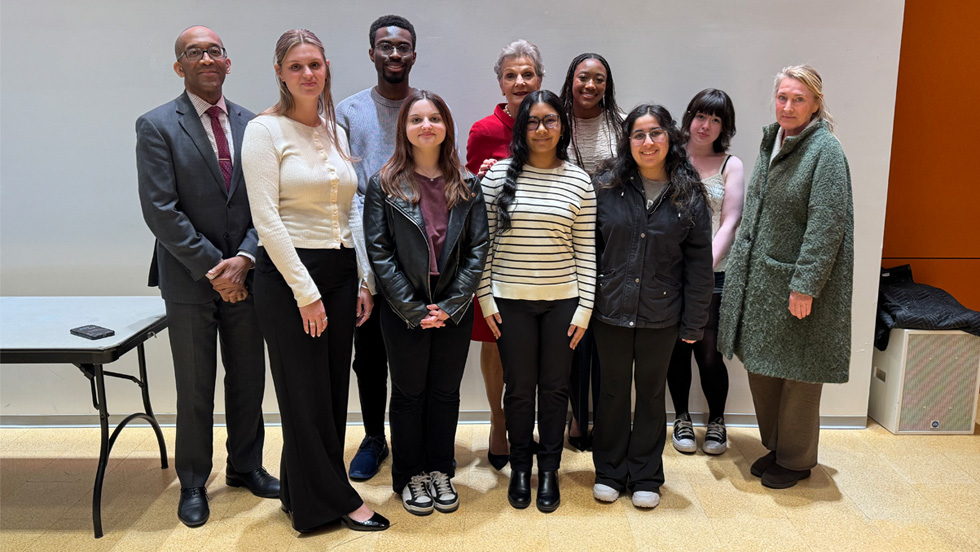
In the United States, academic law reviews are generally found at the graduate level.
In fact, an MIT list of law reviews shows under 20 tied to undergraduate programs. Now, thanks to a handful of enterprising students, Adelphi University joins the ranks of elite institutions like Columbia University, Trinity College and Cornell University in hosting its own official undergraduate journal dedicated to exploring legal topics and ideas.
The Adelphi Undergraduate Law Review (AULR) is the brainchild of Peyton DeRouen, an Adelphi criminal justice major and political science minor. Like many students considering law school who seek career assistance, she visited the Office of Pre-Professional Advising and Fellowships for guidance when she first started at Adelphi. “The director gave me the outline of the law school admissions process as well as what Adelphi had that was pre‑law-oriented in terms of clubs and other initiatives,” she recalled, referring to David Oroza, director of pre‑professional advising and fellowships. “I immediately saw an opportunity.”
Oroza emphasized his office’s mission. “The Office of Pre-Professional Advising and Fellowships is devoted to the success of our students,” he said. “Our goal is to help them get into graduate school. Students contemplating careers in healthcare and law professions receive individualized guidance.”
The AULR Origin Story
A transfer student, DeRouen approached the only other student, at the time, who she knew was interested in pre-law—Samina Radia, who would become AULR’s managing editor—to help spread the word to others and gauge interest in a law review for undergrads. She researched how to form a club on campus, drafted a constitution and filled out the required paperwork. In August 2024, she put out a call for e-board applications, leading her to meet now co-editor in chief Sophia Sewpersad, a business management and English double major. The rest of the team was set by September and the first law review was published in the Spring of 2025, only a year after its formation.
Article topics in the first volume range from divorce and domestic violence to abortion and birth control rights, and international humanitarian law during armed conflict to the balance of power between federal and state in the United States.
The Benefits of Law Reviews
Law reviews allow undergraduates to develop critical legal writing and research skills, gain experience with the publication process and contribute to the broader legal academic conversation on contemporary issues. Adelphi’s student-run publication dives into timely topics, from landmark law cases to emerging debates, providing the reader with well-thought-out and researched arguments while benefiting the writer by providing an opportunity to hone their critical thinking and writing skills.
“At the law school level, law review articles shape legal academia—and are often cited in Supreme Court decisions,” DeRouen explained. “In today’s climate, law and policy affect our daily lives. Writing about them is a way for undergrad students to use their voice and engage beyond social media.” It is also a good way to “build your résumé and professional network,” Sewpersad added.
AULR is not just for pre‑law students; it offers tangible benefits to any student who writes, researches or thinks critically, including, but not limited to, English, business, history and environmental studies majors. All are welcome and encouraged to submit.
“Law lies at the intersection of so many different fields,” said Sung Hoon Kim, JD, AULR faculty adviser and assistant professor in the Department of Mathematics and Computer Science who earned his juris doctorate from NYU School of Law. “In law school, you meet people who majored in various subjects, and the discourse of legal academia benefits from having this diversity of perspective. Having an undergraduate law review is a great opportunity for students to explore and advocate for a topic they care about and to have that work published. Who knows, this experience might even convince you to consider attending law school.”
The Process to Get Published
The AULR team is dedicated to helping those interested in submitting an article easily navigate the process, hosting informational workshops as well as those on best citation practices. After students submit their abstract and article through the journal’s website, the submissions go through a peer review process and a round of editing before being returned to the author for two cycles of revisions. “Peer review is essential,” Sewpersad said. “We require legitimate sources, with information drawn from scholarly or official sources. We emphasize that truth is grounded in sources that are double-, triple- and quadruple-checked.”
Adelphi’s Support System
No student‐run enterprise thrives in isolation—between assistance from the Office of Pre‑Professional Advising and Fellowships and faculty advisers and other supporters, the AULR has benefited from a strong network of guidance and encouragement. By offering events, workshops and mentorship, Adelphi creates the conditions for students to translate interest into action—with AULR as a vivid example where student initiative, infrastructure, faculty support and a mission to amplify legal voices all intersect.
“The faculty response has been overwhelmingly supportive, and already this semester, new students are showing interest in the Law Review,” Sewpersad said. “It’s a really good opportunity, and I’m happy to be part of it.”
Looking Ahead
Submissions for the Spring 2026 journal are now open and are being accepted on a rolling basis with a deadline of March 6, 2026, at 5:00 p.m. EST. Articles, research papers, essays and commentaries are welcome from all students and faculty at any university in any program of study as long as the submission relates to legal issues.
AULR, though new, already demonstrates that when students work together with support and rigor, learning goes beyond grades—it becomes contribution. “I’d love to see the AULR grow to be recognized beyond campus, with the goal to grow it into a nationally heralded law publication,” DeRouen said.